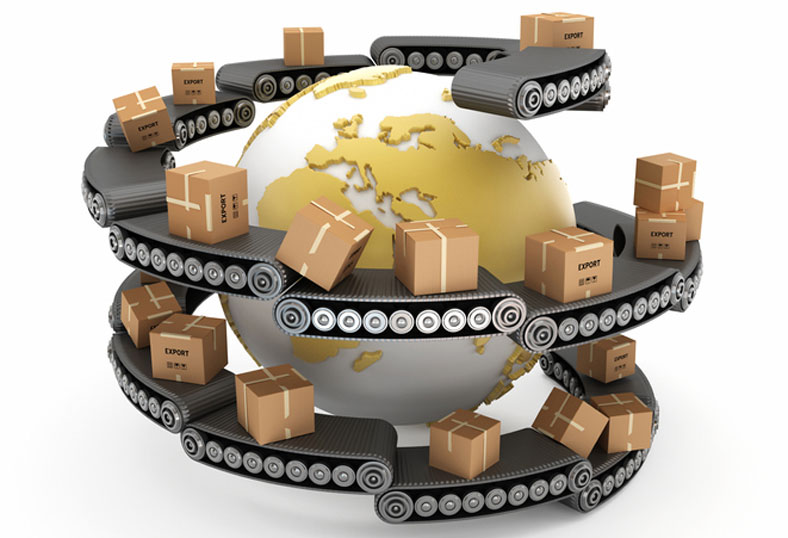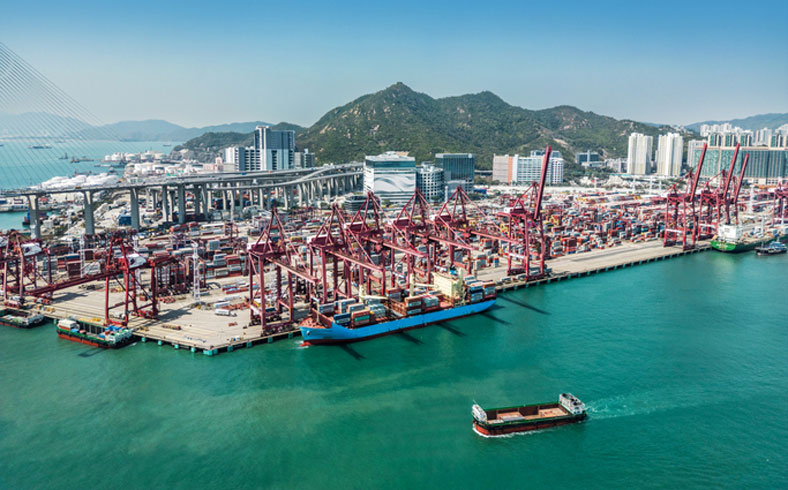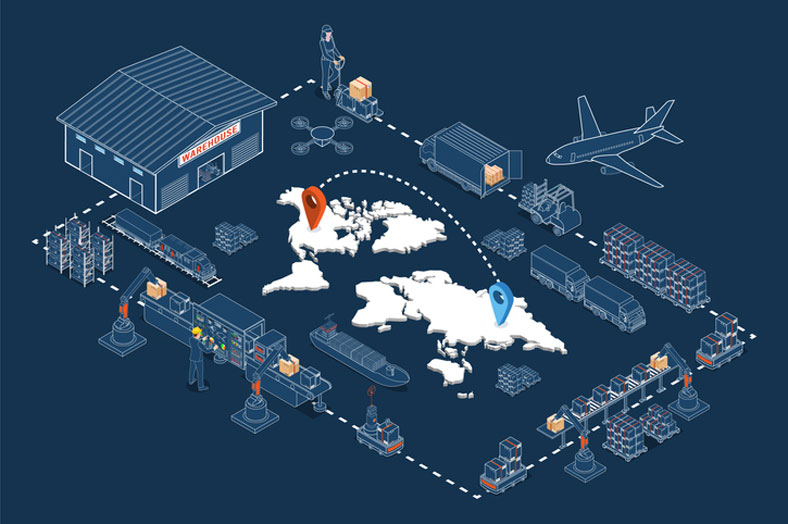Written by Scott Wilson
Global supply chain management is the set of processes used for coordinating transnational shipment of goods, services, and information needed to supply and distribute products. It involves many of the same functional elements of supply chain management in general, but has complicating factors due to the communications challenges, long-distance transportation needs, and various geo-political concerns that come with cross-border trade. To a large extent, supply chains in the modern context are global by nature.

Outside the business world, not a lot of people had heard the term global supply chain until 2020.
That’s the year that global supply chains fell apart, leaving store shelves bare and product orders stretching out for months. The COVID-19 pandemic shuttered factories and closed border crossings around the world.
But the global supply chain has become a permanent feature of modern society. Even as the pandemic caused some lasting changes, the advantages are significant enough that global sourcing and production aren’t going to disappear anytime soon.
Instead, the vulnerability and importance of those long-distance trade routes has only come more into focus. That means global supply chain managers who have learned from the challenges of that period are in higher demand than ever before, called in to troubleshoot and shore-up problematic links.
The first step to getting into global supply chain management, however, is understanding what the global supply chain actually is.
What Is the Global Supply Chain? A Global Supply Chain Definition for Everyday Use

In general, a global supply chain is any system of supply and delivery that spans continents or nations. Different consultants and companies may use the term differently. Some consider any supply chain that crosses international borders to be global in nature. In other cases, they only think of it as global when it crosses oceans.
It’s also missing the mark slightly to ask about THE global supply chain. There’s not just one long international series of connections that every organization taps into. There are millions. Each industry or company that builds a new set of connections to power their organization has a unique set of relationships and challenges to address.
That’s why the definition of a global supply chain shifts to match the organization or industry that it fuels. It could describe the steady march of rare earth minerals from Africa, through to the factories of China and Taiwan that turn them into screens, chips, and smartphone chassis; then through the final assembly factories in ASEAN that put the phones together, and finally into the palms of consumers across North America and Europe.
Or it could be the life-saving drugs concocted in North American pharmaceutical factories and shipped to Asia and Africa, webbing out into remote rural areas, and protecting residents against COVID-19 or HIV.
Both directions require something more than basic logistics skills.
Some Common Characteristics Are Found in Global Supply Chain Examples

While global supply chains may be defined slightly differently or serve different purposes depending on the organization using them, they do share certain common characteristics. These are the aspects of global supply chain management that really make it a different profession from local, national, or regional supply chain management.
Global supply chains require long-distance shipping
The long distances between points in global supply connections require different kinds of shipping techniques and systems. It also introduces different concerns than local shipping. Lead times are longer, the equipment is different, and the complexity is greater whether using air, sea, or rail routes between countries.
Across thousands of miles of open ocean, there’s a lot that can go wrong with any shipment.
Global supply chains span language and cultural expectations
Although English is the international language of trade, there are plenty of regional interactions that happen in other tongues. There are also significant cultural communication challenges to be addressed, where words and concepts may have different meanings. Global supply chain management requires wrapping your head around these challenges and making translations that get the point across anywhere in the world.
Global supply chains deal with customs and international regulatory processes
Crossing borders means dealing with a whole new web of considerations in regulation and legal requirements. Clearing customs can be such a significant challenge that entire expediting firms exist to address it in some countries. In any case, global supply chain managers must ensure their shipments meet several different sets of legal requirements, some of which may conflict, at any given port. They must also understand and comply with treaty-driven international regulatory structures.
Global supply chains need international communications capabilities
When you start making connections a half-dozen time zones away, timing becomes a problem in communication. The internet has all but done away with the scratchy international undersea cable phone calls that global supply chain managers used to endure. But it hasn’t eliminated the difficulty of trying to get hold of a port official in Zanzibar when you’re calling from the New York office at 3pm.

Global supply chains are impacted by geo-political issues
Finally, the global supply chain is wrapped up in larger issues of international relations. A perfectly sensible, mutually advantageous supply connection between companies in two countries can be completely up-ended when politicians in either place decide to throw their weight around. International tensions, protectionism, and competition can jam a wrench into the best-planned global supply chain.
Global Supply Chain Managers Have to Deal with International Challenges on Top of Regular Duties
These are factors that take the difficulty of global logistics up several notches above the equivalent jobs in local or regional logistics.
They can impact any of the normal tasks and duties that supply chain managers handle. Analysis and planning positions are important, considering the additional scope of international considerations.
Global supply chain management is not a specialization by itself. Instead, it’s an addition to the traditional roles of SCM such as procurement, storage, shipping, or distribution.
A global supply chain manager has to be well-trained not just in the basics of logistics and planning, but in many social, cultural, and regulatory factors that don’t always have a clear or consistent impact. It takes reasoning and soft skills to get things done in the ever-shifting global supply chain.
If Global Logistics and Supply Chain Management Is So Complicated, Why Is It So Common?

Global supply chains exist for specific reasons. There has to be some advantage to sourcing or distributing internationally to make them worth the extra overhead.
In many cases, that’s cost. Variations in wealth and standards of living in various countries make it inherently cheaper to hire labor in some areas. Where those areas can be combined with the technical standards for manufacturing or other labor-heavy supply chain requirements, a global supply chain may make sense.
Resources are another reason. Certain rare raw materials may be found only in certain parts of the globe. Where those are a requirement or even an advantage for making certain products, manufacturers have no choice but to source globally.
Expertise is one of the final drivers behind globalized supply chains. A skilled workforce that can perform certain tasks may be the result of a specific industry strength or educational system in some part of the world. When that’s the case, then creating goods in that region and shipping them elsewhere may be far more profitable than attempting to recreate the same conditions locally.
Preparing To Become a Global Supply Chain Manager with a College Degree

Considering the complexity of global supply chain management, it’s clear that a college degree in SCM will be the first stop for anyone preparing to work in the field. The crossover between social sciences, management, and engineering all come together in a traditional liberal arts curriculum. These come with both the key planning and technical knowledge that supply chains are built on, but also the soft skills and cultural understanding that international connections require.
A Bachelor of Science in Business Administration in Global Supply Chain Management or a Master of Science in Global Supply Chain Management, for example, are specialized programs aimed directly at the challenges of international supply chains.
Another common choice is the Master of Business Administration in Global Supply Chain Management. Blending executive-grade business skills with SCM classes, they offer strategic and cultural perspective on long-distance supply chains.
For anyone who has already built up a fair level of education and practice in more local supply chain work, a Certificate in Global Supply Chain Management can deliver the international edge. With only a few classes and usually less than a year of time to invest, these are less expensive and less comprehensive than a full degree. But they are laser-focused on the subjects that global supply chain managers need to master.
Although the global supply chain has certainly suffered some setbacks in the past few years, it’s not going away anytime soon. As long as materials, components, resources, and labor can be accessed at a lower cost overseas, global trade will occur. And global supply chain managers will be the ones making it work.







